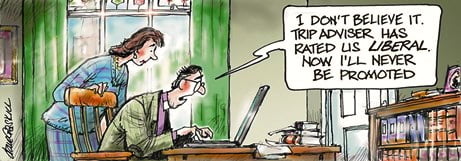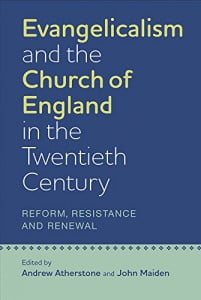Are evangelicals taking over the Church?
 Something has changed in the Church of England. It is a radical change, but ane that has not attracted much comment. I was alerted to information technology when Martyn Snow was announced every bit the next Bishop of Leicester. A diocese with a long tradition of liberal leadership, nigh recently under Tim Stevens, has appointed someone with an evangelical outlook, and the youngest diocesan in the Church to boot. And this is not an isolated instance.
Something has changed in the Church of England. It is a radical change, but ane that has not attracted much comment. I was alerted to information technology when Martyn Snow was announced every bit the next Bishop of Leicester. A diocese with a long tradition of liberal leadership, nigh recently under Tim Stevens, has appointed someone with an evangelical outlook, and the youngest diocesan in the Church to boot. And this is not an isolated instance.
Amongst the five senior diocesans, Canterbury, Durham, Winchester and York are clearly evangelical, and in London nosotros have a traditional (rather than liberal) catholic. In the next tier nosotros discover Chester, Bristol, Birmingham, Coventry, Sheffield, Carlisle, Peterborough and Leeds, and and then include at least Blackburn, Bathroom and Wells, Guildford, Southwell and Nottingham, Rochester and Europe, and you take a formidable representation of evangelicals in the House of Bishops—one without precedent in mod times.
It is important both to authorize and to clarify what this means. Bishops are famously reluctant to own theological 'labels', and for understandable reasons. They are, after all, in that location to office as a focus of unity around the Church's teaching, not to serve as signal-scoring for particular traditions or signs of shallow triumphalism. And the presence of then many evangelicals volition non satisfy the extremes. Liberals worry near a threat to the 'broad church'; conservatives volition wonder why it remains and so broad—apocryphally request of consecrations, 'Is that the point in the service where they remove your backbone?'
The reasons for this change are deep and historical, and we need to understand why nosotros have got here in order to see where we are going.
Within the evangelical tradition itself, the reasons attain back at to the lowest degree fifty years. At the commencement National Evangelical Anglican Congress (NEAC) at Keele in 1967, a major question was whether evangelicals, yet with a sense of being a beleaguered minority, should stay within the Church of England at all. Martyn Lloyd Jones of Westminster Chapel had said no—they should 'come up out from among her' and course a pure, uncompromised, evangelical church. John Stott, of All Souls' Langham Place, urged evangelicals to stay, engage, and result change from within. Stott won the day—though his position and then nonetheless does not convince everyone now. Evangelicals are non ever practiced at compromise.
At the second NEAC in Nottingham in 1977, Anthony Thiselton (later Professor at the university at that place) urged a 2nd kind of appointment by evangelicals—with scholarship, and in item with the developing discipline of hermeneutics. He was opposed by my and so-hero David Watson, who at one signal in the Congress openly mocked him—but Thiselton won the argument (and I ended up doing a PhD in exactly this area).
This commitment to engage has borne remarkable fruit. In 2007, Gordon Kuhrt (who had been the first Director of the newly formed Ministry building Division of Archbishops' Council) analysed what was happening to theological traditions in ordination training and institute something remarkable. thirty years previously, evangelicals deemed for around xxx% of ordinands entering training. Past the time of his writing, this had changed to seventy%. This wasn't because the numbers of evangelicals coming frontwards had increased, but because the numbers of catholics and liberals (to use the iii broad categorisations) had dropped off. It is not difficult to empathise that, all other things existence equal, the tradition of ordinands in ane historic period will become the tradition of the Church's leadership in the next.
Post-obit Thiselton's urgings, evangelicals have also been active in engaging with theology. I was in the starting time cohort experimentally to move direct to doctoral study from ordination training, and many other evangelicals accept done the aforementioned. As a issue, there are evangelicals in every tradition of residential college, and (significantly) teaching on courses as well as in context-based training. Evangelicals no longer stick doggedly to parish ministry building—their traditional remit—merely are also now surface area deans and archdeacons and involved in sector ministries. The one area largely untouched is that of cathedral deans. The large number of evangelical bishops is just the episcopal tip of an ecclesiastical iceberg.
Within the Church itself, Mission-Shaped Church (which came to Synod when I was final a member in 2004) marked a watershed. It was now possible, credible and even desirable to talk about mission explicitly as an Anglican, in a manner it wasn't after Towards the Conversion of England (1945) nor even after the Decade of Evangelism. This explains why evangelical episcopal appointments are not the result of a conspiracy; Vacancy in See committees are request for a credible commitment to mission, and evangelical candidates are giving plausible answers.
 Is this situation likely to proceed? To respond that, take a look at the youngest diocesans, since they will exist around for some fourth dimension to come, and are the virtually likely to occupy senior positions in the future. They are (in historic period order) Leicester, Southwell and Nottingham (both 48), Gloucester (53), Guildford (54), Europe (56), Coventry, Chichester, Chelmsford (all 57), Winchester, Ely, Leeds, Truro, Sheffield, St Albans and Manchester (all 58). Of these 15, 10 look evangelical, and another two 'traditional' catholic, and only 3 more than liberal. And the high proportion of evangelical ordinands looks set up to continue; a major route is through youth work, and xc% of youth workers are employed by evangelical churches. Whatsoever tradition diversifies every bit it expands, and debates volition continue about who are 'true' evangelicals. Every bit Andrew Atherstone and John Maiden point out in the excellent Evangelicalism and the Church of England in the Twentieth Century (Boydell Printing, 2014) that debate was as lively in the before lean years equally in these years of plenty.
Is this situation likely to proceed? To respond that, take a look at the youngest diocesans, since they will exist around for some fourth dimension to come, and are the virtually likely to occupy senior positions in the future. They are (in historic period order) Leicester, Southwell and Nottingham (both 48), Gloucester (53), Guildford (54), Europe (56), Coventry, Chichester, Chelmsford (all 57), Winchester, Ely, Leeds, Truro, Sheffield, St Albans and Manchester (all 58). Of these 15, 10 look evangelical, and another two 'traditional' catholic, and only 3 more than liberal. And the high proportion of evangelical ordinands looks set up to continue; a major route is through youth work, and xc% of youth workers are employed by evangelical churches. Whatsoever tradition diversifies every bit it expands, and debates volition continue about who are 'true' evangelicals. Every bit Andrew Atherstone and John Maiden point out in the excellent Evangelicalism and the Church of England in the Twentieth Century (Boydell Printing, 2014) that debate was as lively in the before lean years equally in these years of plenty.
Martyn Atkins, when General Secretary of the Methodist Conference, reflected on how we could go nearly Resourcing Renewal (Inspire, 2007). Renewal comes, he argued, when an institution rediscovers its 'founding charisms' and, paradoxically, this is what is needed to face an uncertain future. I wonder whether the presence of evangelicals, at every level of ministry, might aid this process for the C of Eastward—that we recover what information technology means to be a reformed catholic church. This ways not being reformed and catholic (and liberal), living in different silos, nor executing an evangelical 'takeover'—but that our variety is held together by means of a cogitating biblical theology shaped past insights from previous generations (tradition) and informed by responsible intellectual engagement (reason).
Whatever its pros and cons, this new configuration of the Church is likely to be here for some time to come up.
A revised version of this article was published in the Church Times on 19th Feb 2016.
Follow me on Twitter @psephizo
Much of my work is done on a freelance basis. If you lot have valued this post, would you lot considerdonating £1.xx a calendar month to back up the production of this blog?
If you enjoyed this, do share it on social media (Facebook or Twitter) using the buttons on the left. Follow me on Twitter @psephizo. Like my page on Facebook.
Much of my work is done on a freelance basis. If you lot have valued this post, you can make a unmarried or echo donation through PayPal:
Comments policy: Adept comments that engage with the content of the post, and share in respectful debate, tin add real value. Seek first to sympathize, then to exist understood. Brand the most charitable construal of the views of others and seek to larn from their perspectives. Don't view debate as a conflict to win; address the argument rather than tackling the person.
Source: https://www.psephizo.com/life-ministry/are-evangelicals-taking-over-the-church/
0 Response to "Are evangelicals taking over the Church?"
Postar um comentário